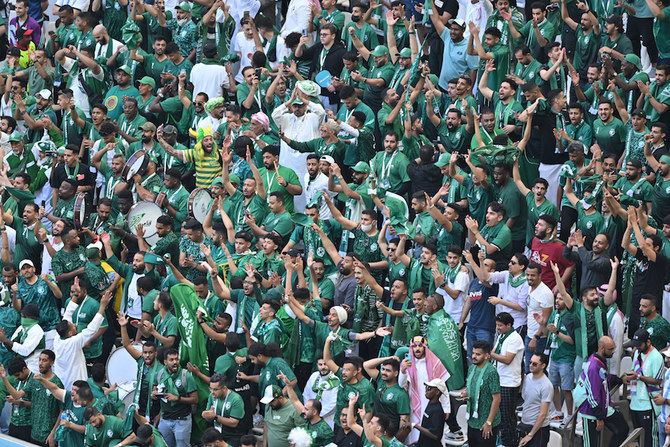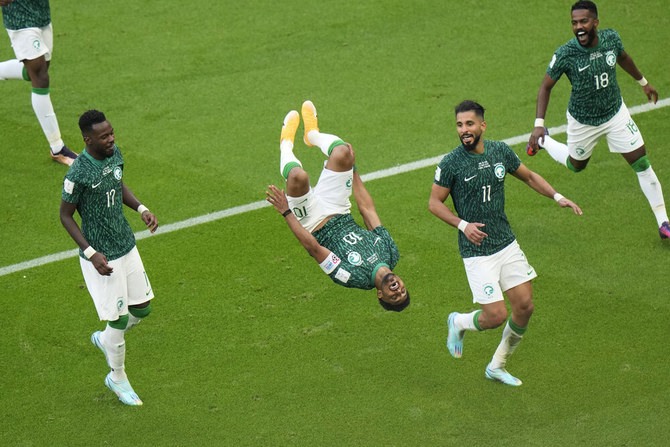RIYADH: On Nov. 22, 2022, the Lusail Stadium in Qatar witnessed an extraordinary moment that will be forever etched in the annals of World Cup history.
In what is widely considered one of the most significant upsets in the tournament’s history, Saudi Arabia, a nation with modest World Cup expectations, delivered a performance that sent shockwaves across the footballing world by defeating Argentina 2-1.

Saudi Arabia stunned Lionel Messi’s Argentina , beating the two-time winners 2-1 in one of the biggest upsets in World Cup history. (AN Photo/Basheer Saleh)
For the Saudi team, the victory over Argentina was not merely a win; it was a defining moment that transcended the realm of sport, and became a symbol of national pride and perseverance.
To grasp the magnitude of this achievement, one must consider the context. Argentina, led by the maestro Lionel Messi, entered the tournament as one of the favorites, boasting a squad replete with talent and experience. The Argentine side had lifted the Copa America the previous year, signaling a return to its traditional footballing prowess.
In stark contrast, Saudi Arabia’s national team, the Green Falcons, was viewed as an underdog. A squad that included several players plying their trade in local leagues was expected to be overwhelmed by the South American giants. Yet, it was this very expectation that perhaps fueled the Saudi team’s determination and tactical acumen.
The match began with Argentina asserting their dominance early on. Messi, ever the catalyst, orchestrated attacks with his customary flair. The opening goal, scored by Messi in the 10th minute, seemed to confirm the prematch predictions. Most of the fans in the packed stadium believed that Argentina would continue its dominance throughout the game.

Saudi Arabia stunned Lionel Messi’s Argentina , beating the two-time winners 2-1 in one of the biggest upsets in World Cup history. (AN Photo/Basheer Saleh)
However, Saudi Arabia’s response was nothing short of remarkable. The team, managed by Herve Renard, a French coach known for his tactical expertise and past successes with underdog teams, showed an unwavering resolve. Their defensive line, meticulously organized, employed a cunning offside trap that saw three goals by Messi and Lautaro Martinez disallowed. Renard’s tactical adjustments were evident as Saudi Arabia shifted gears, pressing higher up the pitch and exploiting gaps in Argentina’s defense.
The turning point arrived in the 48th minute. Saudi Arabia’s Saleh Al-Shehri, who had been a constant threat to the Argentine defense, received a well-placed pass and slotted the ball past Argentine goalkeeper Emiliano Martinez. The goal ignited a wave of jubilation among Saudi fans, and set the stage for an unforgettable second half.
The drama continued to unfold. Just five minutes after Al-Shehri’s equalizer, the Green Falcons took the lead through a stunning strike from Salem Al-Dawsari. The goal, a brilliant display of precision and composure, left the Argentine defense stunned. Lusail Stadium reverberated with the ecstasy of Saudi supporters, who dared to believe that their team could pull off a historic upset.

Saudi Arabia stunned Lionel Messi’s Argentina , beating the two-time winners 2-1 in one of the biggest upsets in World Cup history. (AN Photo/Basheer Saleh)
Argentina, shocked by the sudden turn of events, launched a relentless assault in search of an equalizer. Messi and his teammates tested Saudi goalkeeper Mohammed Al-Owais with a series of powerful shots and intricate passes, but the Saudi custodian was in sublime form. Al-Owais’ performance was a cornerstone of the victory, with a string of crucial saves protecting his team’s lead.
As the final whistle blew, the stadium erupted in a cacophony of cheers and disbelief. Saudi Arabia had achieved a 2-1 victory over one of the most decorated teams in football history. For the Green Falcons, the victory was a testament to their grit, resilience, and the power of believing against the odds.
The aftermath of this historic match saw an outpouring of national pride in the Kingdom. The victory was celebrated not only as a footballing achievement, but also a unifying moment for the country. It inspired a generation of young players, and demonstrated that even the most daunting challenges could be overcome with dedication and determination.
For Argentina, the defeat served as a harsh reminder of the unpredictability of football. Despite their eventual progress to the World Cup final, where they emerged victorious, the loss to Saudi Arabia was a jarring episode in their campaign. It underscored the volatile nature of the sport, where even the most favored teams can stumble against underdogs.
As World Cup history continues to unfold, Saudi Arabia’s triumph over Argentina remains an ecstatic highlight, symbolizing the essence of the beautiful game: the potential for miracles and the joy of overcoming adversity. For Saudi football, the match is forever imprinted in the hearts of its people, a moment of profound significance.





























